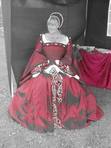Judith Arnopp's Blog, page 26
April 5, 2021
As Part of The Coffee Pot Book Blog Tour I am delighted to host Virginia Crow and her book, The Year We Lived

Book Title: The Year We Lived
Author: Virginia Crow
Publication Date: 10th April 2021
Publisher: Crowvus
Page Length: approx. 118,000 words – approx. 350 pages
Genre: Historical Fiction
The Year We Lived
Virginia Crow
(Blurb)
It is 1074, 8 years after the fateful Battle of Hastings. Lord Henry De Bois is determined to find the secret community of Robert, an Anglo-Saxon thane. Despite his fervour, all his attempts are met with failure.
When he captures Robert’s young sister, Edith, events are set in motion, affecting everyone involved. Edith is forced into a terrible world of cruelty and deceit, but finds friendship there too.
Will Robert ever learn why Henry hates him so much? Will Edith’s new-found friendships be enough to save her from De Bois? And who is the mysterious stranger in the reedbed who can disappear at will?
A gripping historical fiction with an astonishing twist!
Buy Links:
Amazon UK • Amazon US • Amazon CA • Amazon AU • Barnes and Noble • Waterstones • Kobo • Smashwords • Crowvus

 Author Bio:
Author Bio:Virginia Crow grew up in Orkney, using the breath-taking scenery to fuel her imagination and the writing fire within her. Her favourite genres to write are fantasy and historical fiction, sometimes mixing the two together such as her newly-published book "Caledon". She enjoys swashbuckling stories such as the Three Musketeers by Alexandre Dumas and is still waiting for a screen adaption that lives up to the book!
When she's not writing, Virginia is usually to be found teaching music, and obtained her MLitt in "History of the Highlands and Islands" last year. She believes wholeheartedly in the power of music, especially as a tool of inspiration. She also helps out with the John O'Groats Book Festival which is celebrating its 3rd year this April.
She now lives in the far flung corner of Scotland, soaking in inspiration from the rugged cliffs and miles of sandy beaches. She loves cheese, music and films, but hates mushrooms.
Social Media Links:
Website • Twitter • Facebook • Instagram • Publisher • BookBub • Amazon Author Page • Goodreads

April 1, 2021
The Coffee Pot Book Blog Tour spotlighting Toni Mount's latest release, The Colour of Evil
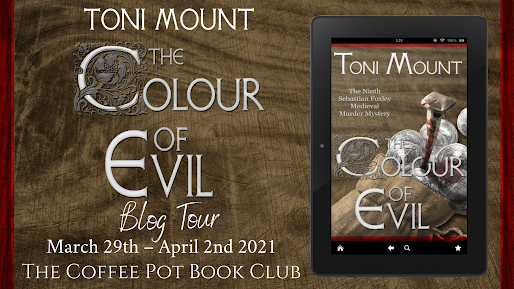
Book Title: The Colour of Evil
Series: The Sebastian Foxley Medieval Murder Mysteries
Author: Toni Mount
Publication Date: 25 March 2021
Publisher: Madeglobal.com
Page Length: 334 Pages
Genre: Historical Fiction / Mystery

The Colour of Evil
Toni Mount
(Blurb)
‘The Colour of Evil’
Every Londoner has money worries, and talented artist and some-time sleuth, Seb Foxley, is no exception.
When fellow craftsmen with debts to pay are found dead in the most horrid circumstances, fears escalate. Only Seb can solve the puzzles that baffle the authorities.
Seb’s wayward elder brother, Jude, returns unannounced from Italy with a child-bride upon his arm. Shock turns to dismay when life becomes more complicated and troubles multiply.
From counterfeit coins to deadly darkness in London's worst corners. From mysterious thefts to attacks of murderous intent, Seb finds himself embroiled at every turn. With a royal commission to fulfil and heartache to resolve, can our hero win through against the odds?
Share Seb Foxley’s latest adventures in the filthy streets of medieval London, join in the Midsummer festivities and meet his fellow citizens, both the respectable and the villainous.
Excerpt from The Colour of Evil
Mallard Court in Grace Church Street (pp. 64-67)
The vintner, Clement Mallard, lived in a grand place further up Grace Church Street, opposite the Leadenhall. Guy Linton’s premises had impressed me but this establishment was close kin to Crosby Place, where the Duke of Gloucester resided when in London. I recalled that it had also been built for a wealthy merchant, the grocer John Crosby. Clement Mallard could likewise afford a similar fine house, with its grand gated entrance into a paved courtyard and marble steps leading up to the great hall beyond. It was as well that I be familiar with Crosby Place, else I may have felt intimidated by Mallard Court.
I followed Guy – apparently we were upon such terms now that the use of first-names was permitted – up the steps, into the hall. I remained somewhat behind him, posing as his humble assistant. Thus was I laden like a pack-horse, carrying the offending portrait and a good deal of artist’s paraphernalia besides my own scrip. I disliked this subterfuge more with each passing minute.
‘You’re late, Linton,’ Mallard growled by way of greeting. ‘And who’s this?’ The vintner waved his hand vaguely in my direction, frowning. ‘I don’t want anybody coming here, uninvited. You know that.’
‘Ignore him, Master Mallard. He’s only my assistant. I needed help, carrying my stuff, is all.’ Thus, Linton introduced me. ‘Set up the easel, brushes and pigments there, by the fireplace,’ he instructed me, ‘And then sit out of the way, behind my line of sight, and keep silent. Don’t disturb me at my work.’
I made no answer. The reply that sprang to mind was not of a suitably servile nature but I did as bidden. I sat just behind and to the left of Guy, such that I might view the sitter from the same angle, taking out my charcoal and cheap papers ready pinned to my drawing board in such wise as not to attract the vintner’s eye. I had commenced my first sketch afore Guy had even settled the half-painted portrait upon the easel and dipped his brush.
The subject had little to recommend it. A true likeness would not be one that any but the blind could possibly take pleasure in gazing at. I should not want it hung upon my wall. That expression would turn ale sour and set children wailing. In truth, the physical features were of common proportions – not as Guy had painted them – and naught out of the ordinary, topped by thinning grey hair. But the eyes held such malevolence as I had ne’er espied in any other. If the eyes be the windows of the soul, as we be told, then this one must surely be beyond saving, belonging to Satan already. I was hard pressed not to cross myself. Suspicious brows were drawn low over these twin pools of darkness, as though to keep their secrets hidden. Even as I drew them, I shivered. Creating their likeness chilled me.
The skin had an unhealthy, jaundiced hue – Guy had painted that aright; it was not wholly caused by light reflecting from the golden curtains – and lay upon the bones beneath like a creased bed sheet. Every line bore the mark of ill-humour. These were not the characterful wrinkles of old age but the deep-scoured imprints of malice and spite. It was hard to gauge this sitter’s age at all but the gnarled fingers, contorted by swollen joints, suggested three score years, or thereabouts, at least.
But, as Master Collop used to instruct: I drew what I saw; five minutes of worthwhile observation giving birth to a few lines of exactitude. In a short space, I had the sketches required of the sitter and tucked my board away in my scrip, out of sight, glad to turn my eyes to more pleasing views.
The parlour at Mallard Court was well appointed. A gilded ceiling looked to be well constructed and I noted the carving on the beams of what I first thought to be a skein of geese in flight. But no. Of course, they were ducks: mallards, a play upon the vintner’s name. The fireplace was surrounded by a carven mantle and here, too, images of ducks outnumbered all else. I had ne’er considered these birds to be evil creatures. My son loved to watch them swimming on the water of the Horse Pool and they gave me pleasure also, admiring the iridescent plumage of the drakes, their determined waddling gait upon land. Yet these ducks looked to thirst for blood. I turned away to gaze out the window. I was becoming over-fanciful, imagining such foolish things as ill-intentioned ducks.
When Guy breathed a heavy sigh and turned to me, holding out his brushes, indicating that I – being but his lowly assistant – should clean them, the vintner pushed out of his cushioned chair.
‘Show me the portrait,’ he demanded. ‘I have waited long enough to see your handiwork, Linton. I will see it – now!’
‘No, no, Master Mallard.’ Guy threw a cloth over the portrait, despite the likelihood that the last strokes of egg tempera were yet wet. ‘’Tis ill-luck to see it in its unfinished state.’
‘Who says so?’
‘’Tis a well-known fact, I assure you. Isn’t that right?’ Guy looked at me, his desperation clear.
‘I have heard it said,’ was all I would offer in support.
‘Next time, it will be finished, master, then you can view it as you wish. I promise you.’
Master Mallard muttered to himself, glaring at Guy.
‘Next time, then, and woebetide you, Linton, if it’s not finished. I’ve wasted enough time on this damned porterate business. I have more important matters to attend to.’ With that, he stomped out of the parlour, leaving us to clear and tidy away the materials and equipment. We had not been offered so much as a cup of water and the chamber had grown stuffy and over-warm as the afternoon sun poured through the glazed windows. In truth, with the need for subterfuge ended, I stood back and watched Guy pack up his things. Every craftsman has his own way of it, I told my conscience; better if he does it himself. Indeed, he ‘tidied’ his things much in the manner of his workshop – that is to say, in careless wise, with no thought to ensuring his brush-ends would dry in goodly shape nor securing his pigment pots to preserve the precious powders. E’en so, I helped him carry his stuff back down Grace Church Street to his house where he had manners enough to offer me ale.
Praise for Colour of Evil:
Samantha Willcoxson, author & historian: “Toni Mount is simply brilliant. If you love CJ Sansom’s Matthew Shardlake – and I do – you will love Toni’s Sebastian Foxley. From learning how a 15th century scrivener created illuminated manuscripts to venturing within the dank tunnels beneath the Tower of London, Toni is an artist who completely immerses the reader in another time and place and always leaves one eager for the next book.”
Stephanie Churchill, author of historical fiction and epic fantasy: “Leave it to Seb to unravel another international spiderweb of intrigue, betrayal, murder, and deceit. Our flawed, loveable hero has done it again. And at the end of it all, his future is looking brighter than ever. I cannot wait to find out what happens to him next!”
Sharon Bennet Connoly, author and medieval historian: “A beautifully crafted mystery that brings the dark, dangerous streets of medieval London to life. Toni Mount is a magician with words, weaving a captivating story in wonderful prose. The Colour of Evil is, to put it simply, a pleasure to read.”
Kathryn Warner, medieval historian and author of numerous books about the fourteenth century, including biographies of Edward II and Isabella of France: “The ninth instalment of Toni Mount's popular Seb Foxley series is sure to delight Seb's many fans. Mount puts her deep knowledge of late medieval England to good use once again, and takes us on another exciting adventure, this time with Seb's older brother Jude, returned from Italy, in tow. Mount's detailed world-building, as always, brings fifteenth-century London to life.”
Buy Links:
Available to read FREE with Kindle Unlimited!
Amazon UK: Amazon US: Amazon CA: Amazon AU: Amazon IT: Barnes and Noble: Waterstones:
Author Bio: Toni Mount
 Toni Mount earned her Master’s Degree by completing original research into a unique 15th-century medical manuscript. She is the author of several successful non-fiction books including the number one bestseller, Everyday Life in Medieval England, which reflects her detailed knowledge in the lives of ordinary people in the Middle Ages. Toni’s enthusiastic understanding of the period allows her to create accurate, atmospheric settings and realistic characters for her Sebastian Foxley medieval murder mysteries. Toni’s first career was as a scientist and this brings an extra dimension to her novels. It also led to her new biography of Sir Isaac Newton. She writes regularly for both The Richard III Society and The Tudor Society and is a major contributor of online courses to MedievalCourses.com. As well as writing, Toni teaches history to adults, coordinates a creative writing group and is a member of the Crime Writers’ Association.
Toni Mount earned her Master’s Degree by completing original research into a unique 15th-century medical manuscript. She is the author of several successful non-fiction books including the number one bestseller, Everyday Life in Medieval England, which reflects her detailed knowledge in the lives of ordinary people in the Middle Ages. Toni’s enthusiastic understanding of the period allows her to create accurate, atmospheric settings and realistic characters for her Sebastian Foxley medieval murder mysteries. Toni’s first career was as a scientist and this brings an extra dimension to her novels. It also led to her new biography of Sir Isaac Newton. She writes regularly for both The Richard III Society and The Tudor Society and is a major contributor of online courses to MedievalCourses.com. As well as writing, Toni teaches history to adults, coordinates a creative writing group and is a member of the Crime Writers’ Association.Social Media Links:
Website: Website: Twitter: Facebook: Instagram: Amazon Author Page: Goodreads: Fantastic Fiction:
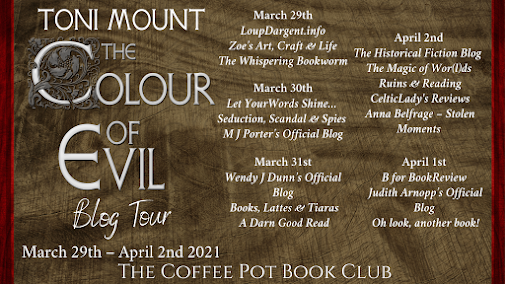
March 22, 2021
The Coffee Pot Book Club casts a Spotlight on Ropewalk by H. D. Coulter
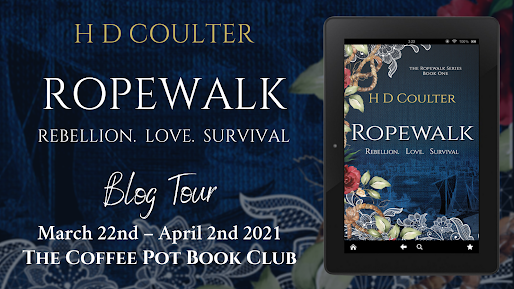
Book Title: Ropewalk; Rebellion. Love. Survival
Series: The Ropewalk series
Author: H D Coulter
Publication Date: 23rd November 2020
Publisher: Independently Published
Page Length: 243 Pages
Genre: Historical Fiction

Ropewalk; Rebellion. Love. Survival
(The Ropewalk Series, Book 1)
By H D Coulter
The North of England, 1831.
The working class are gathering. Rebellion is stirring, and the people are divided.
Beatrice Lightfoot, a young woman fighting her own personal rebellion, is looking for an opportunity to change her luck. When she gains the attention of the enigmatic Captain Hanley, he offers her a tantalising deal to attend the May Day dance. She accepts, unaware of the true price of her own free will.
Her subsequent entanglement with Joshua Mason, the son of a local merchant, draws all three into a destructive and dangerous relationship, which threatens to drag Beatrice, and all she knows into darkness.
Now, Beatrice must choose between rebellion, love and survival before all is lost, and the Northern uprising changes her world forever.
Buy Links: Amazon UK: Amazon US: Universal Link to other bookshops:
Signed copies avavilable on the website!
Pre-Order BOOK TWO HERE
Universal Link to other bookshops:
Author Bio:
Hayley was born and raised in the lake district and across Cumbria. From a young age, Hayley loved learning about history, visiting castles and discovering local stories from the past. Hayley and her partner lived in Ulverston for three years and spent her weekends walking along the Ropewalk and down by the old harbour. She became inspired by the spirit of the area and stories that had taken place along the historic streets.
As a teacher, Hayley had loved the art of storytelling by studying drama and theatre. The power of the written word, how it can transport the reader to another world or even another time in history. But it wasn't until living in Ulverston did she discover a story worth telling. From that point, the characters became alive and she fell in love with the story.
Social Media Links: Website: Twitter: Instagram: Facebook:

March 21, 2021
The Test of Gold by Renee Yancy

The Test of Gold
Hearts of Gold, Book 1
Renee Yancy
Publication Date: 15 March 2021
Publisher: Vinspire Publishing
Page Length: 335 pages
Genre: Historical Romance
(Blurb)
Raised in the shadow of a mother who defied convention, but won’t allow her own daughter the right to make the same choices, heiress Evangeline Lindenmayer has been groomed since childhood to marry into the British aristocracy.
When Lindy challenges her mother’s long-laid plans by falling in love with a poor seminary student, the explosion is bigger than the Brooklyn Bridge fireworks on Independence Day.
An excerpt from The Test of Gold
May 1897
Jack glanced at the empty dining chair across the table. For the last fortnight, his mother hadn’t been strong enough to come downstairs for supper and grew steadily weaker. The windows of the dining room were open to the spring air, and the fresh scent of newly-turned flower beds drifted through. Children played on the street outside as the days grew longer. But in this room with his uncle, silence lay heavy like a tomb. Only the clink of silverware against the china gave any evidence of life.
Jack’s thoughts went to the library in the Lindenmayer mansion, where earlier this afternoon, Miss Lindenmayer had shared some details of her life with him. Funny, he’d never thought about what life might be like for the high society young women in the church. That they would marry a man of their parent’s choosing. But what about love? His parents had married for love. And then his father had died young, leaving his mother in a precarious position with no means of support. If it weren’t for his uncle...
“Have you no conversation this evening?” His uncle glowered at him, his lower lip thrust out in a most unpleasant way. His surliness had increased in direct proportion to his mother’s worsening condition.
Startled, Jack tore his thoughts back to the present. “I’m sorry, Uncle.”
“What are you thinking about?” Do I dare answer honestly? He laid his fork down. “My parents actually. Their marriage.”
His uncle’s face screwed up into a frown. “A mistake from the start.”
Jack blinked, not expecting such a blatant statement of disapproval. “Pardon me, sir? A mistake?”
“They were never suited.” His uncle chomped viciously on a piece of beef, swallowed it, and speared another piece. “Never should have been allowed.
“Never should have been allowed?” Jack choked out.
“Stop repeating everything I say. You heard me.”
“My mother would never say that. She loved him. And he her.”
His uncle glared at him. “She was too young to see how shallow he was. My brother swept her away with his smooth charm and pretty words. And then what does he do? Goes out and gets himself killed.”
“He could hardly have planned that,” cried Jack, fury rising in him.
“Stop shouting.” His uncle helped himself to another serving of beef. “It’s fortunate for you and your mother I took you in.”
Jack swallowed hard. Calm down. Don’t rise to the bait. His uncle would never have voiced these thoughts if Mother had been at the table. Until now, he’d never realized how much of a buffer she’d always been between them. And as her illness worsened, the crotchetier his uncle became.
Buy Links:Author Bio
 Renee Yancy is a history and archaeology nut who writes the kind of historical fiction she loves to read – stories filled with historical detail that immerse you in another place and time. When she isn't writing historical fiction or traveling to see the places her characters have lived, she can be found in the wilds of Kentucky with her husband and two rescue mutts named Ellie and Charlie.
Renee Yancy is a history and archaeology nut who writes the kind of historical fiction she loves to read – stories filled with historical detail that immerse you in another place and time. When she isn't writing historical fiction or traveling to see the places her characters have lived, she can be found in the wilds of Kentucky with her husband and two rescue mutts named Ellie and Charlie. Website: Twitter: Instagram: Facebook: LinkedIn:
Amazon Author Page: Goodreads:
March 18, 2021
The Coffee Pot Book Blog Tour introduces Widow’s Lace by Lelita Baldock

Book Title: Widow’s Lace
Author: Lelita Baldock
Publication Date: 23 March 2020
Publisher: Independently Published
Page Length: 242
Genre: Historical Fiction / Mystery
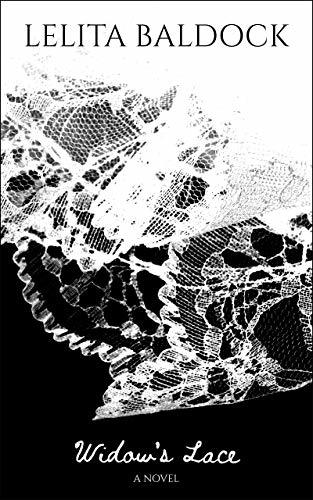
Widow’s Lace
By Lelita Baldock
(Blurb)
A hundred year old mystery, the widow left behind, a fallen soldier, the abandoned fiancée, an unnamed body and the young student determined to find the truth.
In 1886 famous English poet Edward Barrington moves from Derbyshire, England to a farm on the Finniss River, in South Australia. Two years later he disappears.
25 years later Archie Hargraves abandons his fiancée Clara and travels from England to meet with Edward’s widow, Rosalind. He plans to write a biography and make a name for himself, independent from his wealthy father. Returning to England in 1914 he abandons his work to join the war in Europe. His journal of notes from Australia is never released.
Ellie Cannon, a young PhD candidate at Sydney University, is writing a thesis on one of Barrington’s last known poems, The Fall. It’s not going well. Struggling with her relationship with her mother and loss of her father, Ellie is on the brink of failure.
Then a body is found by the Finniss River, 130 years after Edward’s disappearance. Could it be the famous poet?
The discovery draws Ellie into the worlds of Edward, Archie and Clara, taking her across Australia and England in her search for the truth.
Covering life in remote South Australia, the social pressures of 1900s Britain and the historical role of women, Widow’s Lace is an historical fiction, mystery cross-over dealing with themes of obsession, fear, love, inner-secrets and regret. But also the hope that can come from despair.
Part Two: Edward
Chapter 6
I approach. Hesitant step.
Head too high to see horizon’s future. Gently glowing golden aura.
Port of London, England 1886
The long, loud wail of the ship’s horn blew a second time. Edward, sitting in his carriage on the dock, took a deep steadying breath. It was time. Gripping the carriage handle, he straightened his shoulders and swung out of his seat landing lightly on the dockside. Before him the docks teamed with activity; families of steerage passengers trying to navigate the crowded space while keeping together and managing their luggage; cargo boys hauling barrels and steering groups of pigs and lambs, presumably water and food for the journey; baggage men carting the belongings of the wealthy. Several boats were in port. Large bales of what Edward supposed was wool and barrels of wine were being hauled by dirty, hefty workers. Smoke rose from large chimneys on the deck of one of the cargo ships, creating a hazy shimmer over the dock, its heat and smell permeating the air and mixing unpleasantly with the slimy scent of the fish some men were catching further downstream.
Despite all the bustling distractions of the port, it was their passenger vessel that dominated the scene. The Orient, her dark steel sides glistening in the morning sun, rose up from the water like a leviathan. Long and sleek, her body would house some 500 hundred souls on her voyage to Australia. She was a combined design, powered by steam on the run through the Suez Canal, then by sail as they surged across the empty oceans of the Southern Hemisphere.
Currently, her decks were awash with sailors checking ropes and packing sails or having a final cigarette before official duty began. Edward closed his eyes a moment, gathering himself. You can do this, he told himself firmly. His thundering heart beat a silent retort he resolved to ignore.
Edward scanned the docks for a luggage worker to manage his belongings.
'Excuse me, sir,’ a young man clad in tailored trousers and an Orient jacket stood before Edward. ‘Mr Barrington I presume? I’m Mr Davids, here to arrange your luggage, sir.’
‘I am Mr Barrington. Thank you. There is quite a lot I’m afraid, you may need to get some help…’
‘Don’t be worrying yourself, sir,’ the young man grinned up at Edward as he moved towards the luggage strapped to the back and top of the carriage. ‘Cabin 34, am I correct? ‘
‘Yes, thank you.’
‘Course, sir. Leave it to me.’ Mr Davids turned calling out to a group of lads standing off to the side dressed in brown slacks and shirts, not an Orient colour among them. The boys came running over, all pimples and fuzzy beards and began loading themselves up with more bags and boxes than seemed feasible before heading for the ship. Mr Davids swung a smile at Edward and joined them, leaving him adrift in the sea of activity. He strode to the carriage and opened the door once more, ‘Darling, if you are ready to board?’
A white gloved hand appeared from the carriage to grip his own and he gently guided his wife, Rosalind Barrington, down the carriage steps to the dockside.‘
‘Oh!’ The soft sound escaped her lips, but not his notice. Edward gripped her waist quickly, steadying her against the pull of gravity that threatened as her knees wobbled beneath her.
‘I am sorry my love,’ Rosalind breathed, ‘I must have risen too fast from my seat.’
Edward stared hard into her deep green eyes. Grey smudged the hollows beneath them, her skin waxy and pale. ‘Of course,’ he lied and gave her his most reassuring smile.
Rosalind smiled back, transforming her features to those of the healthy woman he married, offering a glimpse of why they were here, his hope and promise. If only for a moment.
They’d met three years ago at his poetry recital in Manchester’s neo-gothic town hall. Dressed in green silk trimmed with black lace, hair gathered in large cascades, eyes bright with copper tinge, Rosalind had turned every head in the room. Edward could not look away. Showing an uncharacteristic confidence, he’d approached her, dared to touch her arm, invited her to Hathrone to take tea. She accepted. A week later they stood beneath the apple trees, red with winter’s promise and declared their hearts.
‘I love you,’ he had whispered.
‘I love you too. But, I must warn you. I am to be a divorced woman. I will… damage your reputation.’
Edward had laughed. Rosalind’s brutish husband was well known in society, loudly decrying his wife for the absence of an heir, while escorting a series of young women about town.
‘I am overjoyed that you are to be divorced. I do not wish to have you as a mistress. I wish to make you all mine. Now and always.’
Overcome, tears limned Rosalind’s eyes.
Gently Edward wiped them away. ‘Don’t cry my love, not ever again. Until my last breath I will protect you. We will never know loneliness and sorrow again.’
They fell into each other and on a bed of leaves sealed their love, skin to skin, forever.
Straightening her sun hat, Rosalind turned to take in the docks. ‘This harbour is much larger than I expected, there are boats lining the water out as far as I can see.’
Edward leaned in close to her ear and whispered, ‘Follow the inlet with your eyes, where it seems to meet the sky? That is the start of our journey to Australia!’
Rosalind turned to face him, bringing their eyes, their lips closer. He felt a huff of breath as she laughed lightly, ‘What an adventure we are to begin.’
Edward’s heart tightened at the bravery of her words. Throwing social etiquette to the winds, he pecked her on the cheek, her skin warmer than it should be beneath his lips.
‘Come Mary, it is time we boarded,’ he called back to the carriage.
The older lady, well into her 60s, stepped gingerly from the carriage, the swelling of her ankles and lower legs had been troubling her more as the days cooled into autumn. Her right hand clutched a single satchel, all her worldly possessions. She had been with Rosalind since his wife was a child, it would have been cruel to take a younger maid. Mary had earned this. She looked up at him and nodded stoically. They turned as one and walked to the Orient, their transport to another country, almost another world. And hopefully a new life.
Buy Links:
Amazon UK • Amazon US • Amazon CA • Amazon AU • Barnes and Noble
Is your book on Kindle Unlimited? Yes
Author Bio:
 Lelita Baldock
Lelita BaldockLelita has a passion for stories, especially those with a dark undercurrent, or a twist to be revealed.
She hopes to tell interesting stories that people will find themselves drawn into. Stories that are for entertainment and escape, and hopefully a little thrill of the unexpected. She truly enjoys the experience of writing, exploring human traits and reactions as well as the darkness that can lurk unexpectedly inside anyone.
Born and raised in Adelaide, Australia, Lelita holds a Bachelor of Arts majoring in English and History from the University of Adelaide and a Bachelor of Education from The University of South Australia. During her twenties she worked as an English teacher in both Australia and the United Kingdom, working with the International Baccalaureate curriculum.
Now Lelita and her husband run a web development business, and she makes time for writing after hours and on weekends. It can mean long days and late nights, but she doesn’t mind, stories are her passion.
Lelita’s long term goal as a writer is to be able to publish her stories regularly and hopefully appeal to a wide range of readers.
Lelita currently resides in the United Kingdom with her husband Ryan and beloved rescue-cat, Jasmine.
Connect with Lelita:
Website • Twitter • Instagram • Facebook • Book Bub • Amazon • Goodreads
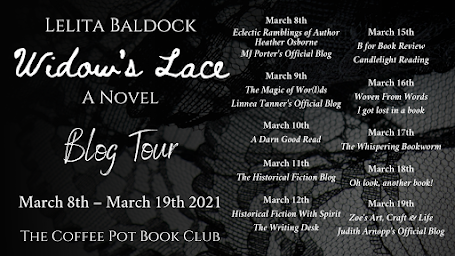
March 8, 2021
The Dark Shadows of Kaysersberg
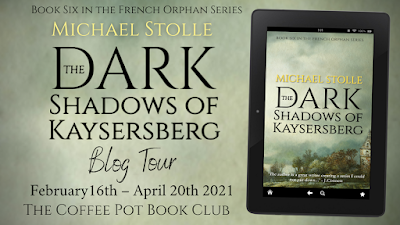
The Dark Shadows of Kaysersberg
The French Orphan Series, Book 6
By Michael Stolle
It’s 1646 and infant King Louis XIV reigns over France; wily Cardinal Mazarin holds the reins of power - but he needs money, desperately.
Armand de Saint Paul, the younger son of a great and rich noble house, is leading a carefree life in Paris, dedicating his time to such pleasures as gambling, hunting and amorous pursuits.
Unexpectedly, Armand has to defend the honour of his house in a duel that transpires to be a deadly trap, set up by a mighty foe of the house of Saint Paul.
Will Armand be able to escape the deadly net of intrigue that soon threatens to destroy him?
How can a young man deal with love, when it’s no longer a game, but a dream beyond reach?
The leading question is: What is going on behind the façade that is Castle Kaysersberg,
where nothing is as it seems to be … until the day when the dark shadows come alive?

Excerpt from The Dark Shadows of Kayserberg
‘Don’t worry, as long as you are under my roof, nobody will drag you out of your bed. Not even the King’s Musketeers,’ François replied. ‘Let me see who has arrived and let me deal with them.’
He left the room and Pierre and Armand looked at each other.
‘He can be relaxed,’ finally Armand broke the silence, ‘what if de Lantenay gave me away? Duels are forbidden, you know the punishment.’
‘How could he? De Lantenay thinks that you’re dead,’ Pierre replied putting on a brave face. ‘Nobody knows that you’ve survived or where you are. Only your parents would know. You’re safe here.’
As the surprise visitor came closer, they could discern the first voices downstairs through the open door.
‘Oh no, I know this voice far too well,’ Armand cried out. ‘That’s even worse than the musketeers. Can I hide somewhere?’
Pierre listened and immediately understood his friend’s predicament.
‘Oh my God! I hear your father’s voice. You must be very brave now. Hiding is useless.’
The Marquis de Saint Paul entered the room, dressed in most sombre black velvet and lace. Only the sparkle of his diamond buttons and a large sapphire ring lightened up his sober appearance. The light of the candles hit the precious stones and brought them alive with a fierce sparkle. He stepped forward and eyed his son as if he had just discovered a strange exotic animal.
‘Armand, what a pleasant surprise. You seem to be in high spirits?’
‘Oui, mon père.’ Armand swallowed. ‘I hope you and Maman are fine as well?’
‘We couldn’t be any better, my dear son. We might have been slightly bored lately. You know, older people tend to have their daily routines, but luckily enough we have a vivid son who’s trying hard to keep us entertained.’
Armand preferred to stay silent.
‘Can I offer you a chair and refreshment, Monsieur?’ François tried to break the ice.
‘Nothing can beat excellent social graces,’ the marquis replied, ‘I prefer to stand but a glass of wine would be fine, I feel that I should be reinvigorated after my long travel to be reunited with my son.’
‘How, did you know that I was here, sir?’ Armand asked lamely.
‘Let me tell a story, my dear boy, oh please stay here!’ He addressed Pierre and François, ‘I think you’re so much part of this story that it would be a shame if you missed a part of it.’
The marquis sipped at his wine, served in the meantime by the butler, and commented: ‘Excellent. From your wife’s Italian estates, I gather?’
François only smiled and nodded.
The marquis continued:
‘A young man, charming and handsome but not very bright, was lured into a trap recently. Instead of speaking to his father he must have asked his friends to help – young men tend to be a bit rash and see parental guidance as a burden best to be avoided. The trap was all about challenging the young man’s honour and he had himself manoeuvred into accepting a duel. Like a lamb accepting to be slaughtered.’
‘I couldn’t refuse, Monsieur, the honour of the House of Saint Paul was challenged,’ Armand exclaimed, eyes sparking with indignation.
The marquis sighed deeply as if in pain and continued.
‘The young man, did I already mention that he’s not very bright? Well, this young man asked his friends to act as his seconds. His friends, to be fair, were more alert. They couldn’t refuse his request but realized probably very fast that the young man would never survive this ordeal. I guess they pleaded that he should refuse the challenge, but as the young man, who is also very stubborn, discarded this notion, they hatched a plan.’
‘You hatched a plan?’ Armand exclaimed, and looked at his friends. ‘Behind my back?’
François and Pierre looked at the marquis, dumbstruck.
Smiling ever so lightly, the marquis continued: ‘Yes, they hatched a plan. They found out that the opponent owed a lot of money to his valet and to his own friends, especially the one he had appointed to act as his own second. Luckily, the young man’s friends could afford to bribe both of them, the valet and the second. The deal was to replace leaden bullets by painted clay bullets. Gilbert de Lantenay was reputed to be the best marksman of the Royal Musketeers, known to never miss a target. But of course, the clay bullets wouldn’t do any serious harm. The young man therefore was shot down by one of his own friends as they needed the young man to fall to the earth and bleed. The illusion had to be perfect.’
‘You, you … shot at me?’ Armand was all indignation. ‘How dare you? I could have died!’
‘I did,’ François said calmly, ‘Pierre was too nervous. How did you find out, Monsieur?’
‘Gilbert de Lantenay died some days ago, in his own house. All they could find were some charred bones.’ The marquis replied.
‘I can’t believe my ears, this sounds so strange,’ Armand exclaimed, ‘but that’s great news, I can go back to Paris.’
The marquis continued unperturbed: ‘Listen first. In the meantime, de Lantenay’s valet had been arrested. An anonymous informer had filed a complaint with the authorities. The valet was accused to have killed his master and then staged the fire to cover up his traces. Torture was applied unusually fast and he confessed, as they all do.’ The marquis looked at the friends and his son. ‘I found Gilbert de Lantenay’s sudden death very surprising and most suspicious. Ah yes, I forgot to mention, all was set into motion by the visit of a most beautiful lady, her name is Eloise, does this ring a bell?’
‘Eloise de Verneuil came to visit you?’ Armand exclaimed with a groan.
‘Yes, I had the pleasure, as had your mother who met her even before me. A charming lady, ah, before I forget, she’s expecting a child and sends you her best regards.’
‘Oh no, I’ll never be able to face Maman again.’ Armand was dumbfounded.
‘Eloise opened our eyes as she told us in confidence that she had overheard that our beloved Cardinal Mazarin, the pillar of righteousness and Christian clemency, is planning the demise of the House of Saint Paul.’
The marquis’s mood changed all of a sudden; he was no longer playful:
‘She made it clear that the riding accident of your brother might have been no accident after all – but cold-blooded murder. Murder instigated by the cardinal himself. The duel, she told us, fitted beautifully as the next vicious step to eliminate a potential heir of our house. Amory, my second son, is to be made a cardinal of the Church, thus depriving the House of Saint Paul of future heirs. A devious plan and you, my son, played into the cardinal’s hands by accepting to be lured into this stupid trap. I immediately sent a man of my confidence to the prison. The valet knew that his time was up. He confirmed my suspicions and told me about the duel and the tampered pistols.’
The Marquis de Saint Paul looked at François and Pierre: ‘Let me thank both of you from the bottom of my heart that you saved my son, he may behave stupid from time to time, but he’s my son all the same and strangely enough, we hold him in high esteem.’
‘That’s what friends are for,’ Pierre said simply. ‘Armand saved me so many times, I can’t even remember. I also do tend to behave – stupidly – as you would call it, Monsieur.’
‘I did save you several times, didn’t I? Just think about Montrésor …’ Armand fell in.
‘We have no time for rehearsing old stories, I’m afraid.’ François looked worried.
‘I don’t understand, all is good now. Gilbert de Lantenay is dead and I can return to Paris.’ Armand was upbeat.
‘It’s not that easy.’ Pierre said, ‘there’s a catch to it, right?’
‘Two, to be precise,’ François replied.
‘Can’t you speak in clear terms, why the hell should I not be able to return to Paris now?’
‘You tell Armand.’ The marquis sighed and took another sip of the wine.
François took the clue: ‘First of all, although you survived, the cardinal can still prosecute you as duels are punishable by law. We talk about capital punishment. Even if this is isn’t applied often, it would be an elegant way to get rid of you. Legal, clean, above reproach.’
Armand swallowed, he looked less confident now. ‘And the second catch?’
‘Even if he can’t stage a trial now, you’re on his list if the Countess of Verneuil is correct. The cardinal has a whole army of secret agents working for him,’ Pierre added, ‘your father first must use his influence with Queen Anne to stop this sordid business and make the cardinal understand that he’s playing with fire now that his plans have been discovered. Until then you must stay out of reach and hide.’
‘It’s a great relief that my son has friends who are quick-witted. I haven’t given up hope yet, maybe one day …’
‘Oh, stop it Father, I’m not that dumb. But all of this was a bit much.’
Buy Links:
Author Bio:
Michael Stolle was born in 1957, living and educated in Europe, Michael has always been intrigued by the historical setting and the fact that what makes us human was as true in the 17th century as it is now.
He has been reading and writing about history for longer than he cares to recall...
Social Media Link: Twitter
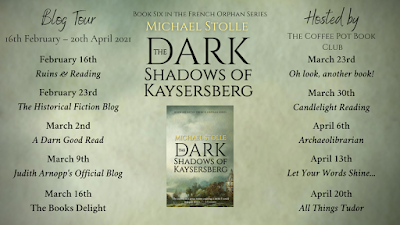
March 7, 2021
Introducing Len Maynard and his fabulous book: A Dangerous Life (DCI Jack Callum Mysteries Book 2)

A Dangerous Life
(DCI Jack Callum Mysteries Book 2)
By Len Maynard
 Len Maynard was born in Enfield, North London in 1953, he has written and published over forty books, the majority of them in collaboration with Michael Sims. Ghost story collections, the Department 18 series of supernatural thrillers, stand-alone horror novels, the Bahamas series of action-adventure thrillers, as well as a handful of stand-alone thrillers. As editors they were responsible for the Enigmatic Tales and Darkness Rising series of anthologies, as well as single anthologies in the horror and crime genres. The DCI Jack Callum Mysteries are his first to be written under his own name.
Len Maynard was born in Enfield, North London in 1953, he has written and published over forty books, the majority of them in collaboration with Michael Sims. Ghost story collections, the Department 18 series of supernatural thrillers, stand-alone horror novels, the Bahamas series of action-adventure thrillers, as well as a handful of stand-alone thrillers. As editors they were responsible for the Enigmatic Tales and Darkness Rising series of anthologies, as well as single anthologies in the horror and crime genres. The DCI Jack Callum Mysteries are his first to be written under his own name.
Blurb
1959
A body of a man wearing theatrical make up is found hanging from a tree on Norton Common in Hertfordshire. He has been tortured and his throat has been cut.
DCI Jack Callum, a veteran policeman with his own rules for procedure, heads the investigation into this puzzling crime. The clues lead him close to the answer, but the solution remains elusive.
Why was the man killed?
What were the victim’s links to London’s gangland bosses?
When an unsolved murder is uncovered that appears to be connected to the case, Jack realises he must use his team to their full strength to separate the innocent from the guilty.
Jack also faces a challenge he never expected as he is accused of an improper relationship with a young Detective Constable on his team, Myra Banks.
In a breathless climax, Myra puts her own life on the line to deal with a figure from Jack’s past, who has now become a lethal threat in the present.
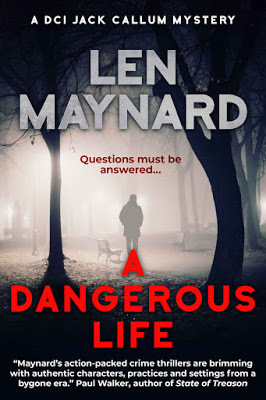
An excerpt from A Dangerous Life (DCI Jack Cullum Mysteries Book 2)
TUESDAY MARCH 17TH 1959
“…So it’s important you remember these three simple rules. One, don’t talk to strangers. Two, never go off with anyone you do not know personally, and three, remember that the police are your friends. We are here to listen and help you whenever we can.” Jack Callum looked up from his notes on the dais at the rows of faces staring back at him with expressions of total apathy.
Cynthia Arnold, the school’s headmistress, sprung to her feet and walked to the front of the stage.
“Very informative,” she said. “I’m sure, School, that you would like to show your appreciation to Chief Inspector Callum for giving up his valuable time to speak to you today.” She started a round of applause that rippled listlessly around the assembly hall and quickly died. “Now, if you could all make your way out, in an orderly fashion, to the playground, where…” She looked down at the piece of paper clutched in her hand. “Where Sergeant Grant and Constable Cooper will explain to you how you can stay safe on our roads.”
There was a hubbub of grumbling voices and shuffling feet as the hall gradually emptied.
“Thank you for that, Mr. Callum,” the headmistress said. “I’m sure your words found a receptive audience.”
“Well, those that stayed awake for long enough might have learned something,” Jack said as he folded his speech and tucked it into the pocket of his jacket. “And can I apologise again that Superintendent Lane couldn’t be here today.”
The headmistress clucked her tongue. “Never to worry,” she said. “I’m sure it couldn’t be helped. In any case, you proved to be a very successful last minute substitution. Full marks.”
“You’re very kind.”
The truth was that Henry Lane had been trying to wheedle his way out of this speaking engagement for weeks. More comfortable swinging a golf club than standing in front of a microphone, a last-minute attack of laryngitis meant that Jack had to take his place, much to his own chagrin. He enjoyed public speaking even less than Lane.
“Well, excuse me,” the headmistress said. “I hear your men have brought a police car along with them to help with their demonstration. I have to see. It’s all rather exciting.”
Jack watched her bustle, excitedly, out of the hall, and then made his way to the side of the stage and the short staircase to freedom.
He trotted down the stairs and pulled up short when a voice spoke from out of the shadows. “Did you mean it?”
Someone was standing a few feet away, hidden by a fold in the curtain.
“Did I mean what?” he said, and a teenage girl stepped out from behind the folded brocade and stood in front of him.
“That the police were our friends and that we should come and talk to you, and you will help?”
Jack smiled indulgently. “We’ll always listen and help if we can…sorry I didn’t catch your name.”
“Gerry…Geraldine Turner.”
“Well, Geraldine, do you have a problem you wish to discuss?”
The girl looked tearful. She nodded, a lock of her curly blonde hair falling out from beneath her Alice band and dropping down over her face. “It’s my brother,” she said.
“Well, what is it you want to tell me about your brother?”
“He’s dead,” she said, biting at her lip pensively. “I killed him.”
“I’m sorry that your time has been so cruelly wasted, Chief Inspector,” the headmistress said. “But our Miss Turner is one of Hatfield County School’s greatest fantasists.”
“So she’s done this kind of thing before?” Jack said quietly, glancing across at Geraldine who sat in the corner of the office, biting her lip pensively and staring down at her shoes, doing her best to avoid meeting his eyes.
“With almost monotonous regularity,” the headmistress said tiredly.
Jack continued to stare at the girl. He couldn’t shake the feeling that, by involving the headmistress, he had betrayed Geraldine’s trust in the most profound way, but he’d had no choice. Being alone in the office with a thirteen-year-old girl would have been seen by most as dangerously inappropriate.
“Still, the school secretary has been in touch with her father and Mr. Turner is on his way in now to take her home. He shouldn’t be long. They live in a lovely house called Elsinore, on the Broadway in Letchworth,” the headmistress said with a smile, gazing wistfully over Jack’s shoulder, through the window to the playground where his junior officers were putting the black Wolseley through its paces, demonstrating stopping times to an audience of bored schoolchildren.
Jack, keeping his voice low, said, “And as far as you’re aware Geraldine doesn’t have, or has never had, a brother?”
The headmistress shook her head. “In our records we have her down as an only child. I’m afraid, Mr. Callum, that teenage girls have a great capacity for making up stories.”
“I have two teenage daughters myself,” Jack said, finding the headmistress’s condescending attitude towards her charges irritating.
“Then I don’t need to tell you, do I?” she said. “You don’t have to stay, you know. I’m sure I can deal with Mr. Turner when he gets here.”
“I’ll hang on. I’d like a few words with him. Besides, I have to wait for my men to finish the demonstration. Sergeant Grant is my lift back to the station.”
“I see,” the headmistress said and, dropping all pretence, stood up, walked to the window and stared out at the car as it performed an elaborate skid on the playground’s tarmac surface. Jack would have to have a quiet word with Constable Cooper about his tendency to showboat.
“Ooh,” she said. “It really is quite exciting.”
Jack went across and sat down on a hard chair next to Geraldine. Apart from her initial pronouncement that she had killed her brother, the girl had said nothing more to him.
“Are you all right, Geraldine?”
“I told you, it’s Gerry,” the girl said without looking at him.
“Sorry, Gerry. Are you feeling okay now?”
Geraldine finally turned her head, a look of contempt in her eyes. “You’re just like the rest of them,” she said. “I trusted you.”
Her words cut deep, increasing the feeling that he’d betrayed her.
Buy Links: Amazon UK • Amazon US
Connect with Len:
Website • Website “The DCI Jack Callum Mysteries” • Twitter • Instagram • Facebook
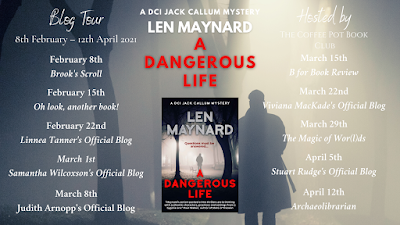
February 21, 2021
Beware the Lizard Lurking by Vivienne Brereton
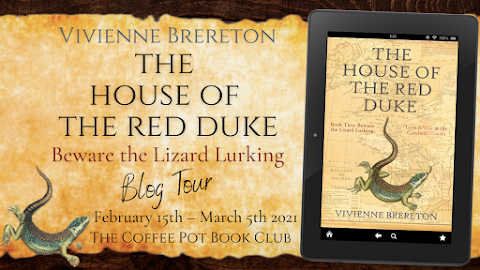
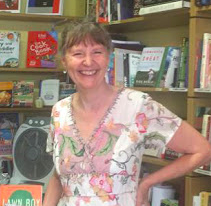 Vivienne Brereton
Vivienne BreretonBorn between historic Winchester and Southampton in the UK, Vivienne has been passionate about the Tudors for as long as she can remember. This led to a degree in Medieval History at university, and the growing desire to write a novel.
However, life took over somewhat and only after stays, short and long, in six countries she called home did she finally settle down to finish her novel.
Words have always played an important part in her life, whether it's been writing, editing, teaching English, or just picking up a good book.
Having three sons came in very handy when she had to write about squabbles between the male characters in her novel. Not so handy when she took her boys to Hampton Court and one of them got lost in the maze!
Seeing 'A Phoenix Rising', the first book in the series 'The House of the Red Duke' in print for the first time was a moment of great joy for her. She very much hopes that anyone reading ‘Beware the Lizard Lurking’, the second book in the series, will enjoy the end result as much as she enjoyed writing it.
Social Media Links: Website • Twitter • Instagram • Facebook

Beware the Lizard Lurking
(The House of the Red Duke, Book 2)
By Vivienne Brereton
Welcome to the candlelit courts of Europe!
Uninvited guests at a secret wedding.
A frozen River Thames.
May Day celebrations to remember.
The young Henry VIII, with the aid of his chief advisor, Thomas Wolsey, and against the counsel of Thomas Howard, the Earl of Surrey, is hellbent on a so-called holy war with France. This puts him at odds with his Scottish brother-in-law, James IV of Scotland, and his older sister, Margaret.
Both Tristan and Nicolas know that time is running out for them before they have to…enter the Church - and into an arranged marriage, respectively. In the meantime, they remain at loggerheads over pretty Ysabeau de Sapincourt, the spoilt young wife of the hapless Robert.
At La Colombe, near Ardres, in Picardy, spirited little Valentine is still making mischief as she sees fit.
Across the Narrow Sea, Cecily is perfectly content in her beloved Zennor Castle, in Cornwall.
None of them know what Dame Fortune has in store for them. Will she allow them to follow their own paths…or has she got other ideas?
An Excerpt from Beware the Lizard Lurking
The following excerpt appears in the Prologue:
Twelfth Night, 1513. London. Thomas More, an upcoming young lawyer, is hurrying home after an audience with the young Henry VIII, hoping to reach his house before a snowstorm.
“It had been a long, arduous day; an exceptionally chilly dawn had given him a disagreeable send-off for a meeting with the young King over at Greenwich. Responding to More’s urgent message that he had something of great import to show their master, the royal summons had been issued by Thomas Wolsey who (to More’s satisfaction) had made it clear in the past how much he valued More’s legal brain. It was well-known in court circles that if you wished to secure a royal audience you had to partake in a game of leapfrog, or sauté-mouton, as it was known in France. Whether frog or sheep - and however much it stuck in the craw of some of the haughtier courtiers - in order to reach the King, it was first necessary to clamber over the increasingly powerful Wolsey. Glancing down at the manuscript, More recalled how Henry (whose every waking thought these days was focussed on a ‘holy’ war with France, on behalf of the Pope in Rome) had seized the spare copy with both hands, as if it were some priceless treasure from one of his grand warships sailing up the Thames.
“‘The Prince’. ‘Il Principe’, by Niccolò Machiavelli. I’m curious to read it,”he’d said. “In my experience, anything Desiderius Erasmus recommends is worth a few hours of my time.”
More’s good friend, Desiderius (like himself, a man of peace dedicated to God’s work), had sent two copies of the manuscript as a New Year’s gift. They’d arrived yesterday morning, accompanied by a letter stating his wishes:
‘Be sure to present one of them to King Henry at your earliest convenience. Better it comes from you or me: men of honour and great learning, than from another who does not truly understand its ability to change the world for good or evil.’
*
Unfortunately, Henry’s sunny mood on receiving Machiavelli’s work had quickly evaporated (leaving More with a slight megrim) when a servant returned with the seemingly calamitous news that none of the Howards could be found anywhere in the Palace. In particular, Edward, the Vice-Admiral of England, one of the King’s favourites.
“How can we manage without Ned?” he stormed, his lower lip white and quivering in sulky protest. “He’s one of the six Lords of the Mount. It’s too late to find a replacement.”
Wolsey had tried his best to placate his mercurial young master, even though it was well-known that there was no love lost between him and the Howards. No doubt the King’s Almoner had no desire to be on the receiving end of an outpouring of wrath that had nothing to do with him: “I’m sure there’s a very good reason, Your Majesty. Perhaps the Earl’s daughter, Muriel, has taken a turn for the worse.”
Even this didn’t appear to soften the King’s heart: a Tudor thwarted was not a pretty sight to behold, More decided.
“They shouldn’t have gone anywhere without my permission,” he snapped back.
Wolsey’s face became a perfect mirror of indignation, but also one tinged with the remnants of an appropriate morsel of sympathy for the ailing Howard girl. “It’s their loss if they don’t make an appearance at what promises to be the best Twelfth Night at any court in Europe.”
More took note of Wolsey’s ability to steer the royal vessel back to calmer waters. Distract and deflect. Two very important words to remember. Henry was at least looking slightly mollified.
“True, Tom.”
“And what better start to a New Year that’s going to end with you as the rightful King of England and France.”
<<Hold your bow steady>> More thought to himself. <<Take aim. And then straight through the heart! Learn from the master. No wonder hitting the heart of the popinjay is called “the King’s shot”>> He quickly made his polite excuses that he needed to catch a wherry back to London Bridge before the weather changed. And breathed a sigh of relief at the satisfying clang of the two heavy oak doors as they closed behind him.”
Buy Links:
Amazon UK • Amazon US • Amazon AU

February 19, 2021
The Coffee Pot Book Club with Richard Tearle and Helen Hollick co-authors of The North Finchley Writers’ Group

The North Finchley Writers’ Group
Richard Tearle, with Helen Hollick
Publication Date: 2nd February 2021
Publisher: Taw River Press
Page Length: 142 pages
Genre: Contemporary Romance
When a group of north London writers meet each month for a chat, coffee, and cake – what else is on their agenda? Constructive criticism? New Ideas? An exciting project? And maybe, more than one prospective romance...?
Eavesdrop on the monthly meetings of the North Finchley Writers' Group, follow some ordinary people with a love of story writing, and an eagerness for success. Discover, along with them, the mysteries of creating characters and plot, of what inspires ideas, and how real life can, occasionally, divert the dream...

Buy Links: Amazon
LET ME INTRODUCE MYSELF
My name – my personal and professional name – is Rob Taylor and I'm a writer.
It is rather strange to state that as a fact after years of scribbling, despair at rejections tempered by moments of high elation when one of my stories was accepted by a respected magazine. But I can state it as a truth now, for I write regularly for several publications, and my first compilation has recently been published with a fixed contract for two more to follow. At the moment, I write short stories, but more than a few friends have encouraged me with prompts such as “You have a novel in you, you know,” and, “A short story has the potential to be a novel writ long.” I am working on the idea.
But enough of that.
About a year or so ago, I was unexpectedly made redundant. Jobless, but with a good-enough redundancy bank balance to keep me going for a bit, and a determination to do what I wanted to do – write – I took the plunge and converted the spare bedroom into a study. I started writing full time and joined the North Finchley Writers' Group, where I met some lovely people who, one way or another, gave me the encouragement to develop my ideas.
All to my satisfaction, but my wife's dismay.
The members of our writers’ group are a very mixed bunch, as you will find out. We meet every month at a different house and whoever is the host gets to provide tea and coffee – often with cake or ‘light snacks’ – and chooses a topic for discussion. We talk, voice opinions and yes, sometimes we argue. But it is all forgotten when we walk away into the night.
Mostly.
They've had quite a turnover of members over the years. Some who came for a couple of meetings and then disappear. Some who weren't really writers but 'dabble' and think that attending a writers' group meeting makes them one. They never last long. Some have moved along and, sadly, one or two have passed on to the great Library in the Sky. Nowadays we have about a dozen or so regulars. There are one or two who are deliberately obstructive. Outspoken. Single minded. Cantankerous.
Some are shy and introvert and, in truth, offer little. But they listen and learn, and that is what we are all there for. To learn from others, be they best sellers or unpublished writers. Because, whatever our differences, we stick together and, if anyone is down, we stand by them and offer encouragement. If someone is on a high, then we enthuse in their success.
Most of us, anyway.
We do have a few Best Sellers. Angela Knight, for example, and Zak Nichols. Charlotte Caroll is more than adept at Regency romances, (not my bag, but, well, credit where credit's due) and Jean Hart uses her history degree to good effect, as does Hilary Jackson, albeit covering a different period of time.
I'll introduce them all properly as we go along...
 A Word From Richard Tearle :
A Word From Richard Tearle :“To the writing community, whether they be traditionally published, indie or aspiring.
You make the rocking world go round...Writers are such a wonderful community – supportive, helpful and ever willing to give their time and expertise to one humble chap such as I. Thank you all from the bottom of my heart. Thank you. Thank you. Thank you.”
Richard – December 2020
 A Word From Helen Hollick:
A Word From Helen Hollick:It was with great enthusiasm that I encouraged Richard to write this, his first novel. His enjoyment of creating a good story, I felt, should be shared to readers and writers, everywhere. Unfortunately, at the editing stage, Richard became ill, involving hospitalisation. In discussion with his son, rather than abandon the project or put it on hold, we decided that the best course of action was for me to continue with getting this book published on his behalf. The characters, plot – the story – are all Richard’s immense talent, I merely tidied up and added the final polish, coming in as ‘painter and decorator’ to Richard’s main role as architect, designer, and builder.
Social Media Links:
Connect with Richard: Website
Connect with Helen:

February 7, 2021
OUT NOW! The Fall of Kings by Stuart Rudge

The Fall of Kings
(Legend of the Cid, Book 3)
By Stuart Rudge
Castile. 1071AD. Three kings. One crown.
After Sancho II of Castile dispatches his champion Rodrigo Diaz de Vivar to capture his brother, King Garcia of Galicia, he hopes it is a defining moment in his quest to reunite the lands of his father under one banner. But Alfonso VI of Leon is one step ahead, and has already added the lands of Galicia to his domain. When the only alternative is war, Sancho turns to Rodrigo to lead the armies of Castile, and he must use all his tactical acumen to defeat the Leonese in the field. Only one son of Fernando can claim victory and become the Emperor of Hispania.
Rodrigo and Antonio Perez, now a knight of the realm, find difficulty adjusting to the new regime. Dissent and unrest run rife throughout the kingdom, and the fear of a knife in the dark from enemies old and new hangs heavy upon the pair. But if it is allowed to fester, it threatens to undo all that has been achieved. Can Rodrigo and Antonio root out the enemies of the king, and prevent chaos reigning throughout the land?
The Fall of Kings is the breath taking third instalment of the Legend of the Cid.

Buy Links:
Amazon UK • Amazon US • Amazon CA • Amazon AU
Stuart Rudge

Stuart Rudge was born and raised in Middlesbrough, where he still lives. His love of history came from his father and uncle, both avid readers of history, and his love of table top war gaming and strategy video games. He studied Ancient History and Archaeology at Newcastle University, and has spent his fair share of time in muddy trenches, digging up treasure at Bamburgh Castle.
He was worked in the retail sector and volunteered in museums, before working in York Minster, which he considered the perfect office. His love of writing blossomed within the historic walls, and he knew there were stories within which had to be told. Despite a move in to the shipping and logistics sector (a far cry to what he hoped to ever do), his love of writing has only grown stronger.
Rise of a Champion is the first piece of work he has dared to share with the world. Before that came a novel about the Roman Republic and a Viking-themed fantasy series (which will likely never see the light of day, but served as good practise). He hopes to establish himself as a household name in the mound of Bernard Cornwell, Giles Kristian, Ben Kane and Matthew Harffy, amongst a host of his favourite writers.
Social Media Links:




